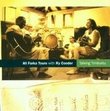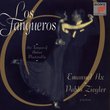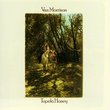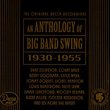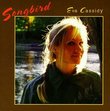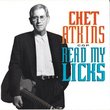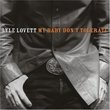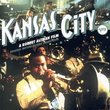| All Artists: Gregory Purnhagen, Philip Glass, Martin Goldray, Mary Ann Hart, Michele A. Eaton, Elizabeth Futral, Richard Fracker Title: Hydrogen Jukebox Members Wishing: 2 Total Copies: 0 Label: Nonesuch Release Date: 10/26/1993 Genre: Classical Styles: Opera & Classical Vocal, Historical Periods, Modern, 20th, & 21st Century Number of Discs: 1 SwapaCD Credits: 1 UPC: 075597928624 |
Search - Gregory Purnhagen, Philip Glass, Martin Goldray :: Hydrogen Jukebox
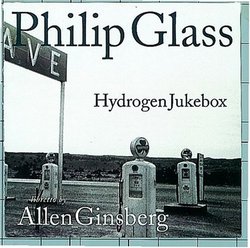 | Gregory Purnhagen, Philip Glass, Martin Goldray Hydrogen Jukebox Genre: Classical
|
Larger Image |
CD DetailsSimilarly Requested CDs
|
CD ReviewsTHIS is Glass's best work - a must own! Justin Weaver | 05/02/2001 (5 out of 5 stars) "I just saw Philip Glass at a screening of Koyaanisqatsi and then at a composer's forum, inspiring me to take to the keyboard (the piano AND the computer version). This is my favorite Glass piece in my ever-growing collection -- ironically, it's the first one I ever bought. The genius of Glass's middle-style -- slow unfolding poignant minimalism with operatic sensibility and universal themes -- comes to absolute fruition where the music meets Allen Ginsberg's insighful, 'deep-thinking' beat poetry. All of the rough edges of the early style (shaky orchestration, the tendency for overkill) seem well-trimmed here... In under an hour and a half Glass creates a masterpiece with every bit as much to say as Einstein on the Beach, Satyagraha or Akhnaten. Indeed, newcomers to Glass ought best to start here. Highlights include Ginsberg's reading from Wichita Vortex Sutra, Aunt Rose, and the final ode to death. And like most all Glass music since the early operas, this piece is very user-friendly for connoisseurs and non-art-music-fans alike. Hydrogen Jukebox is proof that minimalists need not meander adrift on the waves of cyclic time, but can produce grippingly poingnant short pieces. This may well be Glass's masterpiece and deserves greater recognition. Buy now!!" Hypnotic, Jarring, Wrenching History of 20th Century America Shaw N. Gynan | Bellingham, WA USA | 06/17/2005 (5 out of 5 stars) "A friend of mine who is a classical musician was over the other day browsing through my CD collection and found Hydrogen Jukebox. I had played just a bit of it a few years back and was turned off by Jahweh and Allah Battle, what with its frenetic drums and urgent, frantic choral ensemble. I had never returned to it, but I was immediately drawn to Iron Horse, sung by tenor with a pulsing, minimalist atmospheric accompaniment of flute and synthesizer keyboards, typical of Glass. Jahweh and Allah still was jarring, but makes sense in the context of the overall work, which as other reviewers have observed is operatic in scope. The music carefully and effectively reflects the words of Ginsberg. Ah, the words of Ginsberg. Spectacular images of America, the threat of apocalypse reflected in sheet lightning. Love, aging, treachery at the highest levels of government, corruption. All lead to the Buddhist concept of escape into death, peace. There are many examples of thrillingly sublime art. After the frantic war of the gods, we return to the calm of Iron Horse, which features soaring soprano vocalize. The words are deeply haunting and relevant to these terrible times: "Who's the enemy, year after year? War after war, who's the enemy." These are, of course, quite exactly the questions that we are asking ourselves now. Interwoven with the history of America's post-WWII role in the world are frank personal reflections by Ginsberg on the trajectory of his own life. These lend an intimacy to the work and render it all the more poignant. This is especially apparent in "To P.O.," "Cabin in the Woods," and "The Green Automobile." "Cabin in the Woods" captures young love in an exotic location, Calcutta. The music is rhythmic and sonorous. "Cabin in the Woods" opens with the same haunting soprano vocalise that is woven throughout the music and text of this masterpiece. "The Green Automobile" is extraordinary, with a gradual crescendo to a spectacular, joyous climax and a shimmering testament to love and joy. After "To P.O." we are treated to a wild "Crossing Nation" and Ginsberg's reading of "Wichita Vortex Sutra," accompanied by Glass on piano. "Howl Part II" also features Ginsberg, but most of it is sung, with a wild saxophone accompaniment. After this long exploration of 20th century history, "Cabin" is a welcome, quiet, change of pace. The wild "N.S.A. Dope Calypso" documents terrible events and is followed by soothing, elegiac songs. This is an endlessly imaginative work, and as others write, may be his masterpiece indeed. " Could have been very popular, and is still important. Edward A. Leonard | Pearland, TX United States | 02/02/2001 (5 out of 5 stars) "Hydrogen Jukebox is a wonderful melding of Beat poetry and contemporary serious music. I believe that if the recording had been enthusistically promoted when it first was issued, it could have been a best-seller. As it is, it is an important addition to the discerning listerner' collection."
|

 Track Listings (15) - Disc #1
Track Listings (15) - Disc #1